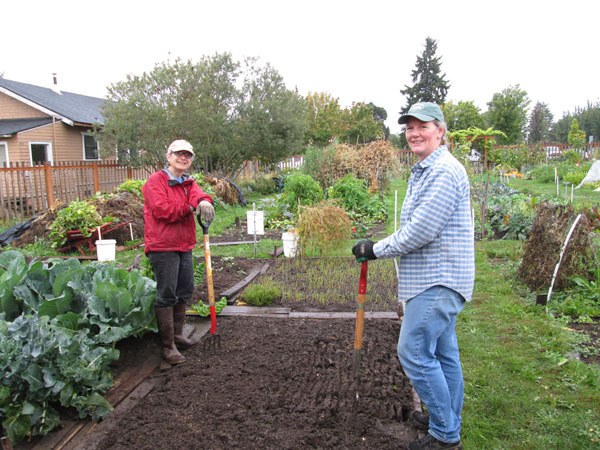Good soil structure is key to a productive vegetable garden. Good soil structure ensures adequate drainage, water and nutrient-holding capacity and air circulation. Good soil structure is dependent on the organisms living in the soil.
Healthy soil is full of life. In addition to larger organisms such as insects, earthworms and plant roots, soil has a diverse population of microorganisms that are too small for the eye to see. One-quarter teaspoon of topsoil can contain a billion microorganisms.
When the large and small organisms in soil break down plant materials and other organisms, they release nutrients and create organic matter.
In turn, organic matter increases the diversity and number of large and small organisms in the soil and their activity. It is an amazing interrelated network.
As the gardener, you can play a key role in keeping your garden soil healthy for these important organisms and your plants.
Gardening practices such as tilling, crop rotation and the use of fertilizers, manures and pesticides, affect the diversity and population of large and small soil organisms.
You can determine whether the soil is healthy for your plants by doing a soil test. (See sidebar.) A soil test will tell you the pH of your soil, its nutrient levels and its ability to hold various plant nutrients.
The pH of soil indicates whether the soil is acid or alkaline. The pH range is from 0 (acid) to 14 (alkaline); 7 is neutral.
Soil pH is important because a soil’s acidity or alkalinity determines what nutrients are available to plant roots. Nutrients in the soil, elements such as nitrogen, phosphorus and potassium, become available to plants when they dissolve in water or soil moisture. Most plant nutrients will not dissolve when the soil is either too acidic or too alkaline.
Soil pH level can be adjusted: adding lime or wood ash will increase the pH of soil, adding sulfur will decrease the pH of soil. How much adjustment is appropriate depends on the crop you are going to grow. Most vegetable crops prefer a pH of 5.5 to 7.5, in the middle of the pH range.
Plants require 13 essential nutrients for health. Nitrogen, phosphorous and potassium are needed in large amounts; other nutrients are needed in lesser amounts.
Necessary plant nutrients are supplied by the soil; if the levels are not sufficient, your plants will suffer. A soil analysis indicates which nutrients your soil lacks and if amendments might be needed.
The ability of soil to hold and release various plant nutrients is called its cation exchange capacity (CEC). Generally, a sandy soil with little organic matter will have a very low CEC while soils high in organic matter (such as humus) have a high CEC.
Clay soil with a lot of organic matter usually has a high CEC, however, the type of clay affects whether the CEC is high or low.
You can improve your soil’s CEC by adding compost or other organic matter.
Increased organic matter has an added benefit in high clay soils. Too much clay can decrease essential air spaces resulting in poor drainage.
Adding organic matter to the soil improves its structure, increasing water infiltration and decreasing soil crusting and water runoff.
Be a part of the process to develop and sustain healthy soil in your garden, not just for your plants but the soil organisms, too.
For more gardening information, attend the Brown Bag Series at the Clallam County Courthouse. These free educational events are held at noon on the second and fourth Thursdays of each month.
On March 10, veteran Master Gardeners will talk about plant families and crop rotation.
Pearl of wisdom
The texture of any soil can be improved by the addition of organic matter such as compost, aged manures and composted grass clippings. Each year, mix organic matter into the top six to 12 inches of your soil.
A single large application does not do the trick; additions over many years are needed to improve the soil texture.
Judy English is a WSU-certified Clallam County Master Gardener.
Soil testing
The Clallam Conservation District runs a low-cost soil testing program to help Clallam County residents make informed decisions about the management of soil nutrients.
They accept soil samples on the first and third Wednesday of each month. The $20 fee covers the cost of the test, recommendations and shipping expenses. They only accept exact cash or checks.
The Clallam Conservation District is at 228 W. First St., Suite H, Port Angeles. For more information, call 775-3747 or visit clallamcd.squarespace.com/soil-testing.


